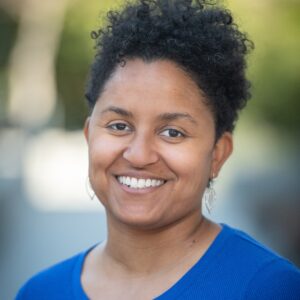
Submissions
2025 Submissions Overview: Important Dates
- Early May 2024
Call for Program Proposals Opens - Sunday, June 30, 2024, 11:59pm ET
Program Proposal Deadline - Mid-August 2024
Annual Meeting Program Committee Meeting - Mid-September 2024
Call for Abstracts Opens
Call for Awards Nominations Opens - Mid-November 2024
Call for Abstract Reviewers Opens - Monday, December 2, 2024, 11:15pm ET
Abstract Submission Deadline
Call for Awards Nominations Closes - Mid-December 2024
Registration Opens - Late February 2025
Research Abstract Acceptance Email Notifications - May 8-11, 2025
AGS Annual Meeting Dates in Chicago, IL
Presented by: Cintia Kimura, Resident in Surgery, Department of Surgery, Stanford University
Talk Title: “Does prehabilitation improve surgical outcomes? Results from the Preoperative Optimization with Enhanced Recovery (POWER) study”
Each week, S-SPIRE hosts a hybrid-model Work-In-Progress session (WIP) for faculty members and trainees to present their research and receive feedback. These run from September through May each year.
Our monthly WIP sessions (first Monday of every month) features Stanford and guest faculty presentations of well-developed projects. This WIP provides an opportunity to discuss high impact research and create synergy within the Stanford HSR/Surgery communities.
Our weekly WIP sessions feature trainees and faculty projects in every phase of development—from drafting specific aims pages, to parsing grant review committee comments, to abstracts/papers/methods in preparation.
Anyone can attend and happy hour conditions apply here too.
For inquiries, please contact Ana Mezynski <mezynski@stanford.edu>
Presented by: Kristen Davis, MPH, Project Manager, S-SPIRE Center, Department of Surgery, Stanford University
Talk Title: “Crafting your NIH Biosketchwith SciENcv–Required Soon”
Bio: Kristen Davis-Lopez, MPH, PMP is the Research Project Manager at the S-SPIRE Center. She has a background in biology as well as public health. She supports multiple principal investigators with their current funded projects as project manager. She leads the Social Science Research Professionals in the S-SPIRE Center and also assists with the grant submission process within the Department of Surgery acting as a liaison with the Research Management Group.
For inquiries, please contact Ana Mezynski <mezynski@stanford.edu>
Each week, S-SPIRE hosts a hybrid-model Work-In-Progress session (WIP) for faculty members and trainees to present their research and receive feedback. These run from September through May each year.
Our monthly WIP sessions (first Monday of every month) features Stanford and guest faculty presentations of well-developed projects. This WIP provides an opportunity to discuss high impact research and create synergy within the Stanford HSR/Surgery communities.
Our weekly WIP sessions feature trainees and faculty projects in every phase of development—from drafting specific aims pages, to parsing grant review committee comments, to abstracts/papers/methods in preparation.
Anyone can attend and happy hour conditions apply here too.
For inquiries, please contact Ana Mezynski <mezynski@stanford.edu>
Due to the winter season, the WIP (Work-in-Progress) series will be paused until regular operations resume on January 6, 2025.
We wish everyone a safe and joyful holiday season! Thank you for your understanding, and we look forward to reconnecting in the new year.
Each week, S-SPIRE hosts a hybrid-model Work-In-Progress session (WIP) for faculty members and trainees to present their research and receive feedback. These run from September through May each year.
Our monthly WIP sessions (first Monday of every month) features Stanford and guest faculty presentations of well-developed projects. This WIP provides an opportunity to discuss high impact research and create synergy within the Stanford HSR/Surgery communities.
Our weekly WIP sessions feature trainees and faculty projects in every phase of development—from drafting specific aims pages, to parsing grant review committee comments, to abstracts/papers/methods in preparation.
Anyone can attend and happy hour conditions apply here too.
For inquiries, please contact Ana Mezynski <mezynski@stanford.edu>
Due to the winter season, the WIP (Work-in-Progress) series will be paused until regular operations resume on January 6, 2025.
We wish everyone a safe and joyful holiday season! Thank you for your understanding, and we look forward to reconnecting in the new year.
Each week, S-SPIRE hosts a hybrid-model Work-In-Progress session (WIP) for faculty members and trainees to present their research and receive feedback. These run from September through May each year.
Our monthly WIP sessions (first Monday of every month) features Stanford and guest faculty presentations of well-developed projects. This WIP provides an opportunity to discuss high impact research and create synergy within the Stanford HSR/Surgery communities.
Our weekly WIP sessions feature trainees and faculty projects in every phase of development—from drafting specific aims pages, to parsing grant review committee comments, to abstracts/papers/methods in preparation.
Anyone can attend and happy hour conditions apply here too.
For inquiries, please contact Ana Mezynski <mezynski@stanford.edu>
Presented by: Aaron Dawes, MD, Assistant Professor of Surgery, General Surgery, Stanford University.
Talk Title: “Despite initial improvements, the impact of Medicaid expansion on continuity of enrollment has waned over time.”
Bio: Dr. Dawes is a board-certified, fellowship-trained colon and rectal surgeon. He is also an Assistant Professor in the Department of Surgery, Division of General Surgery at Stanford University School of Medicine. Dr. Dawes treats a wide variety of conditions involving the colon, rectum, and anus, always leveraging the latest evidence and technologies. He is fully trained in minimally invasive surgical techniques–including laparoscopic, robotic, and trans-anal minimally invasive surgery–and strives to employ them, whenever possible, in an effort to reduce pain and shorten recovery. In addition to his clinical work, Dr. Dawes is a health services researcher, receiving his Ph.D. in Health Policy and Management from the UCLA Fielding School of Public Health. His research focuses on policy development, measurement, and evaluation for patients with colorectal conditions. He is particularly interested in using data to drive policy interventions aimed at reducing disparities in quality, access, and value.
Anyone can attend and happy hour conditions apply here too.
For inquiries, please contact Ana Mezynski <mezynski@stanford.edu>
CALL FOR ABSTRACTS
Submit here: https://www.abstractscorecard.com/cfp/submit/login.asp?EventKey=SPBWQRTG
|
|
|
Presented by:
Carolyn Seib, MD, Associate Professor of Surgery, Stanford University
AND
Heather Day, Biostatistician, S-SPIRE Center, Stanford University
Talk Title: “Using Truveta EHR Data for Clinical Research: Promise and Potential Pitfalls”
Bios:
Dr. Carolyn Dacey Seib is a fellowship-trained endocrine surgeon and board certified general surgeon. Her practice is focused on surgery of the thyroid, parathyroid, and adrenal glands. Dr. Seib has clinical and research expertise in the surgical management of endocrine disorders in older adults, including primary hyperparathyroidism, thyroid cancer, and hyperthyroidism. Dr. Seib completed her undergraduate education at Princeton University, graduating summa cum laude in 2004. She received her M.D. at the New York University School of Medicine and then attended residency in General Surgery at UCSF. Dr. Seib also completed a fellowship in Endocrine Surgery at UCSF, during which she cared for patients with complex disorders of the thyroid, parathyroid, and adrenal glands. Dr. Seib focuses on providing individualized care for patients with thyroid malignancy, hyperthyroidism, primary hyperparathyroidism, and adrenal disorders. She has received funding from the National Institute on Aging and the American Thyroid Association to study the surgical management of endocrine disorders in older adults and has a number of peer-reviewed journal publications on this topic that have received national attention, including being featured in the New York Times.
Heather S. Day, MS, is a Biostatistician for the Stanford-Surgery Policy Improvement Research & Education Center (S-SPIRE). Heather received her Master’s Degree in Biostatistics at the University of Utah. Prior to joining S-SPIRE, she served as a statistician on various studies across multiple clinical disciplines including: biomedical technology, pediatrics, women’s health, epidemiology, and chronic illnesses. As a biostatistician, she works with medical professionals to design, analyze, and interpret findings for research studies.
For inquiries, please contact Ana Mezynski <mezynski@stanford.edu>






